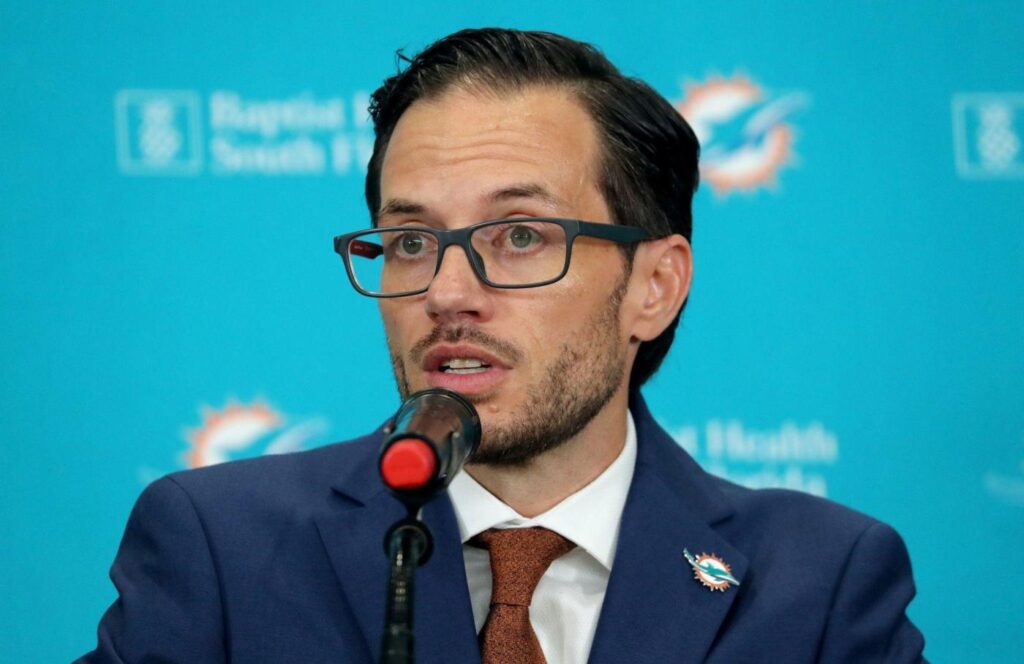
New Miami Dolphins coach Mike McDaniel’s race has been one of the most beaten-down topics surrounding his hire.
It’s because it’s not as simple as black and white.
Without knowing any better, one could just assume McDaniel is white, based on his appearance. But McDaniel’s father is Black. As that information came out during the NFL’s coach hiring cycle while McDaniel became a hotter name as a finalist for the Dolphins, some still didn’t believe it until Andrew Hawkins, McDaniel’s former wide receiver for a year in Cleveland, posted a picture from his parents’ wedding that has since been deleted.
Many have labeled him biracial. Some, including ESPN, have reported McDaniel identifies as multiracial.
“It’s been very odd, to tell you the truth, this idea of identifying as something,” said McDaniel at his Thursday introductory press conference with the Dolphins. “I think people identify me as something, but I identify as a human being. And my dad is Black. So, whatever you want to call it.”
The topic is at the forefront largely because of the NFL’s track record in hiring minorities to prominent coaching roles, specifically Black coaches, when the league’s player population is 70 percent Black.
It has come to light even more so after ex-Dolphins coach Brian Flores filed a class-action lawsuit against the NFL, alleging racial discrimination in the league’s hiring practices and retention of Black coaches. Flores, whose Jan. 10 firing from Miami was a surprise to most and who was expected to land another head job this offseason, was not hired to fill any of the other head coaching vacancies.
At the time Flores filed his suit, Mike Tomlin of the Pittsburgh Steelers was the only active Black head coach in the NFL while the Washington Commanders’ Ron Rivera and New York Jets’ Robert Saleh were the only other minorities. Since, McDaniel was hired on Sunday evening, and on Monday, the Houston Texans promoted Lovie Smith, who is Black, to head coach from defensive coordinator.
Between his multiracial background and the actions taken by his predecessor in Miami, McDaniel has inevitably found himself in the middle of the conversation, although he merely wants to focus on finding on-field success as a first-time head coach.
“It’s weird that it comes up because I’ve just tried to be a good person, and I think my background opens my eyes a little bit,” McDaniel said.
As someone who passes as white, McDaniel understands his experience isn’t the same as a Black person.
“I don’t have any real experience with racism,” he said. “I know my mom experienced it when she married my dad. I know my dad experienced it, and that it’s in my family. I guess that makes me a human being that can identify with other people’s problems. … I know there’s a lot of people with a shared experience.”
McDaniel, in March 2021, told NBC Sports his encounter realizing he was different came at a young age when he visited the house of his grandmother on his father’s side. He looked at photos around the house and realized he looked different than other members of his family.
“It is surreal when I think about it,” McDaniel said then as he was entering his one season as 49ers offensive coordinator after coordinating the team’s run game previously, “but I remember one particular day, walking around and all of a sudden noticing that, ‘Hey, I’m the only fair-skinned person in all these picture frames.’”
McDaniel being named head coach makes it back-to-back hires for the Dolphins with a minority in the position after every other full-time head coach in franchise history was white. Miami also had Todd Bowles, who is Black, as an interim coach at the end of the 2011 season after Tony Sparano was fired.
Dolphins general manager Chris Grier has the longest active tenure for a Black man in an NFL general manager role, holding that position since 2016. He is one of five as Andrew Berry (Browns), Martin Mayhew (Commanders), Ryan Poles (Bears) and Kwesi Adofo-Mensah (Vikings) have joined him since.
